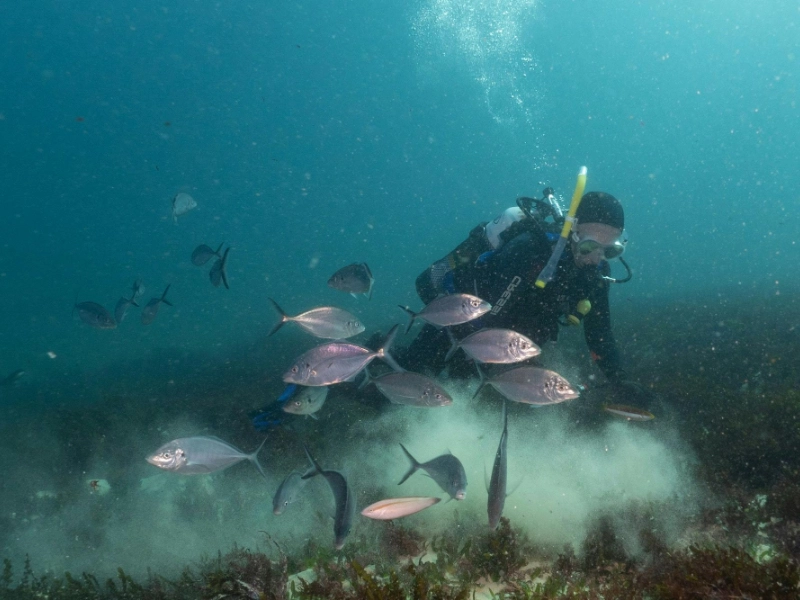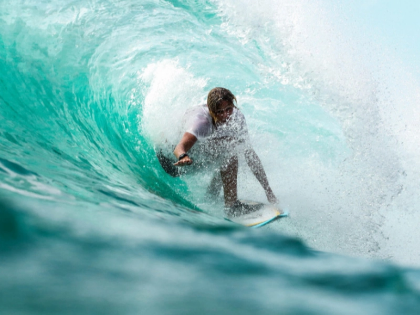Overcoming Dive Fear: Strategies for Uneasy Novices
It's common for people to feel anxious or uneasy about scuba diving, particularly novices. But it's critical to acknowledge this fear and take the appropriate action to get over it. Acknowledging your anxiety might help you prevent the unpleasant consequences of panic, such as a racing heart and a sensation of impending doom. Grounding exercises and encouraging self-talk can also be beneficial.
1. Breathing Techniques

2. Methods of Relaxation
 Diverse panic can result from anxiety brought on by both psychological and physical pressures. Physical stress in scuba diving might come from things like an ill-fitting wetsuit or equipment failures, while psychological stress can come from concerns about witnessing strange aquatic life.
You may overcome this fear and keep it from ruining your diving experience by using relaxation techniques. Breathing exercises and rehearsing successful land dives will help you develop the confidence you need to get over these emotions when diving.
Starting small and working your way up is the best approach to managing dive fear. It's also critical to keep in mind that nervousness can strike even seasoned divers. Overexerting yourself might exacerbate anxiety and result in failures that can bring up repressed memories.
Diverse panic can result from anxiety brought on by both psychological and physical pressures. Physical stress in scuba diving might come from things like an ill-fitting wetsuit or equipment failures, while psychological stress can come from concerns about witnessing strange aquatic life.
You may overcome this fear and keep it from ruining your diving experience by using relaxation techniques. Breathing exercises and rehearsing successful land dives will help you develop the confidence you need to get over these emotions when diving.
Starting small and working your way up is the best approach to managing dive fear. It's also critical to keep in mind that nervousness can strike even seasoned divers. Overexerting yourself might exacerbate anxiety and result in failures that can bring up repressed memories.
3. Illustration
 Professional athletes frequently employ visualisation as a tactic to maximise their performance. It entails focusing on the desired result and creating an accurate mental image of it, complete with all the little details—like whether or not your lanyard might trap on your rope!—in your mind. Before your dive, consider all the situations that can occur and use visualisation to help you prepare. This will lessen the chance that irrational fear will become panicked.
Furthermore, visualisation keeps divers from getting comfortable and helps them brush up on emergency procedures, so even seasoned dives should use it to improve their abilities. Additionally, it enables them to spot anxiety and divert panic symptoms so they may take appropriate action before they worsen and become emergency situations. For novice divers, confined water dives offer a secure and regulated setting in which to hone their skills.
Professional athletes frequently employ visualisation as a tactic to maximise their performance. It entails focusing on the desired result and creating an accurate mental image of it, complete with all the little details—like whether or not your lanyard might trap on your rope!—in your mind. Before your dive, consider all the situations that can occur and use visualisation to help you prepare. This will lessen the chance that irrational fear will become panicked.
Furthermore, visualisation keeps divers from getting comfortable and helps them brush up on emergency procedures, so even seasoned dives should use it to improve their abilities. Additionally, it enables them to spot anxiety and divert panic symptoms so they may take appropriate action before they worsen and become emergency situations. For novice divers, confined water dives offer a secure and regulated setting in which to hone their skills.
4. Self-Talk
 As divers, we must learn how to manage our anxieties and identify the signs of worry. This will assist us in quitting diving as well as other ineffective strategies that may worsen the situation, such as abstaining from alcohol and caffeine before and during a dive.
Speaking to oneself may be a highly beneficial tool, particularly when combined with other methods. The idea is to break negative thought patterns that could trigger panic by using constructive self-talk.
Before attempting a skill that can cause anxiety in an underwater setting, it's crucial to rehearse it in a secure setting (such as a bathtub). By doing this, the mind will become accustomed to dealing with worries and become less susceptible to them at times of real stress. This can be accomplished by using a "fear ladder," in which the diver gradually improves their abilities until they are comfortable enough to enter the water on their own.
As divers, we must learn how to manage our anxieties and identify the signs of worry. This will assist us in quitting diving as well as other ineffective strategies that may worsen the situation, such as abstaining from alcohol and caffeine before and during a dive.
Speaking to oneself may be a highly beneficial tool, particularly when combined with other methods. The idea is to break negative thought patterns that could trigger panic by using constructive self-talk.
Before attempting a skill that can cause anxiety in an underwater setting, it's crucial to rehearse it in a secure setting (such as a bathtub). By doing this, the mind will become accustomed to dealing with worries and become less susceptible to them at times of real stress. This can be accomplished by using a "fear ladder," in which the diver gradually improves their abilities until they are comfortable enough to enter the water on their own.









